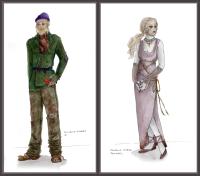Is there a story behind your user name?
My old name was getting pretty, well, old (Ixel), and it was the product of laziness and a lack of creativity, so I decided to change my name to Ms. Steel a few months ago. It comes from my roller derby moniker Minerva Steel, so I thought it would be a fitting change.
What are your interests and hobbies?
For the past six years, my primary interest outside of work has been roller derby; I've both played and coached. Since derby is basically a second job with lots of bruises and no pay (if it's not, you're not doing it correctly), it's an encompassing pass time that leaves very little time for much else, but I have been known to bide my precious little extra time with reading, sewing, drawing, and jewelry-making
.
What types of jewelry do you make?
I like to use good-quality materials (copper, sterling, semi-precious gemstones) to produce unique, affordable jewelry. Interesting, strange and unexpected juxtapositions of shape, color, scale and texture are always fun to play around with, and the end product does tend to have a retro feel to it. Scouring the clearance bin at antique stores is always a great place to pick up odds-n-ends, too, to reuse and breathe some new life into old, broken pieces and components.
What all do you do at roller derbies?
We skate fast, turn left, knock people over and compare bruises...
For starters, my league, The Lehigh Valley Roller Girls (LVRG), are a WFTDA (Women's Flat Track Roller Derby Association) league, so we adhere to a strict ruleset that keeps us out of the realm of the roller derby of yesteryear, which was rife with fixed matches, hair-pulling, catfights and other such stereotypes.
What some people might misconstrue about the roller derby renaissance is that it's not a bona fide, legitimate sport, but it is very definitely a real sport. We, as athletes, train intensively, adhere to the aforementioned ruleset as well as a high level of sportsmanship. What is Roller Derby? gives a pretty good starter overview of what roller derby in general is all about.
Our league runs as a non-profit business, and, in addition to brutalizing people on the track, LVRG also contributes to the community by means of volunteering (we meet regularly with the Boys and Girls club, hold food drives for the local food bank, held raise funds for local charities, etc), in addition to providing a strong role model for women (well, everyone, really) of all ages.
What is it you mostly do on Elftown?
Well, to be honest, I'm kind of a creeper, but I guess most people on Elftown refer to themselves as 'lurkers' instead; I'm a people watcher in life and online. Yeah, weird, whatever. Initially I joined Elftown back during my college years because I like to share artwork and to look at other people's artwork.
Now also I enjoy entering contests (it kinda helps keep one on one's toes when feeling a creative dearth), communicating with some of the people who first greeted me when I first joined and participating in roleplays.
What artistic mediums do you use?
From a 2D standpoint, I like mixed media: Pencil (graphite and colored), watercolor, gouache, markers, acrylic and ink. I do do a little clean-up and adjustment on the computer, sometimes, though.
The media I use reflect the rapid nature of most of my work (a costume designer has to be able to produce an understandable image for the director pretty quickly in most cases), and they're, personally, the easiest and fastest method. Occasionally, I like to fool around with a single medium and weird textures, too.
What is it like being a costume designer?
Some days I can't believe I get paid to do what I do, and others, it seems like they couldn't pay me enough. ;-) As a whole, it's a fairly rewarding job, and, because I work primarily at a college theatre, I also get to guide and help students along the way, too.
Being a costume designer is a combination of being able to collaborate as an artist, being able to visualize not only an end product, but an end product of a whole (you got one costume designed? Great. Now we have to have twenty costumes designed from scratch, but they also need to be relevent in the time period, per character, to create a world, and they need to mesh with the sets and lighting design, too, and, oh, but the way, please stay in budget). For instance, my last design job was the 1940s musical On the Town, and, with a cast of 38 and over 150 costumes, it took a huge amount of planning before hand and careful calculation and consideration before I could even think about putting pen to paper.
Research is also a key part of being a costume designer, whether the piece is modern, no time period or a high period drama, so having a vested interest in reading, discovering and uncovering interesting concepts is necessary.
One of the most difficult aspects of costume design is the human aspect, i.e. the performers, be they actors, dancers, singers, whatever. What many people don't realize, or even sometimes seasoned theatre people fail to see, is that there's a particular type of psychology that comes into play when dealing with people as intimately as a costume designer does. No matter who you are, everyone has some hangup about their body, and frequently, I run into the lack of trust issue, wherein an actor (for me, usually a student) doesn't trust you to make the appropriate decisions not only for the character, but also for the actor's body type. It's tricky and quite a process, sometimes, but a good designer can help a person work through their body image issues. Of course, they're are always those clunkers who are just never happy, either...
Do you ever cross jewelry making and costume designing?
Having the ability to craft in general is a good attribute for any theatrical designer-- yes, I do make/fix/rig jewelry, craft tiaras, hats, various headpieces, and hand bead and applique all sorts of things both for shows that I design for and for other designers. It's really exciting and a compliment when another designer puts all of the crafting for a show entirely into my hands.
Do you always design costumes for the same shows?
In the approximately seven years I have been actively designing costumes, I have yet to re-design a show I've already worked on, especially since I do most of my work through the same theatre (it'll be ten or fifteen years at least before they decide to remount a show that's already been done). It's bound to happen with some of the mainstream shows I've designed the costumes for, though; with my fashion background, I frequently get paired with modern, new and avant-garde pieces, though, and they have yet to stand the test of time.
Have you ever considered breaking into the fashion industry?
I had a brief stint in the fashion industry as a design assistant for a very small, family-owned cashmere sweater company. The job was in New York City, and, as my salary would not allow for any sort of remotely local living arrangements, I commuted Monday through Friday by bus from my home in Pennsylvania. It was only for a year and some change, but that was more than enough.
The title 'design assistant' might sound like fun, but it's really not, and there is really nothing in the way of actual designing involved, frequently. The job did involve a lot of button and zipper sourcing and sample garment measuring. It was great and invaluable experience, however-- I made some good contacts, and I wouldn't trade it for anything.
Mostly, there is a huge amount of attitude and ego in the fashion world, and I simply don't have the time or will to deal it, and I prefer the comfortable world of theatre in comparison. It's a collaborative art that a greater number of people can appreciate, and that's a beautiful thing.
Do you use patterns when you are designing something or do you start the design from scratch?
Both. It's up to the shop manager to make that decision, usually, and it can be dependent upon a few criteria: How much time do we have for the build time, how easy is the garment to draft or drape, or would it be better to find a pattern similar to the desired end product?
If something is very specifically designed, sometimes it's better to start from scratch. Even when we do utilize commercial patterns, however, it's not verbatim. We'll frequently 'Frankenstein' something, where we might use to collar from one pattern, and a sleeve from another. We can easily use a bought pattern as a starting point, but the end product isn't necessarily what that pattern orginally was.
What do you like most about science fiction and fantasy?
The science fiction and fantasy genres are so great because the range of what qualifies for each is so expansive and they are, in a way, infinite-- the only real limit is one's imagination (so I guess I feel sorry for people with poor imaginations). It's always fun to exercise one's creativity, yet it's also an easy and wonderful way to collaborate with like-minded people. There's a little something for everyone to enjoy, except for those among us who only get their kicks from, ya know, non-fiction and electronics manuals.
What is your advice to all Elftowners?
1. Learn how to sew! It's an invaluable life skill.
2. You're never too old to play make-believe.
3. Life is a grindstone; whether it polishes you up or wears you down is up to you.
Any comments, suggestions or criticisms on any particular Elftown matter?
Mostly, I'd just like to express my gratitude to the volunteers who keep Elftown up and running!
Last, I will need two pictures of you to use for the feature:


| Show these comments on your site |
 Stumble!
Stumble!
